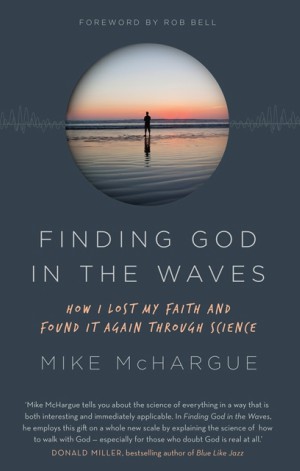Finding God in the Waves by Mike McHargue
McHargue, a former atheist with a recaptured faith, wants the believer to receive both science and faith, truly accepting that the former gives fact and the latter meaning
 Finding God in the Waves
Finding God in the Waves
By Mike McHargue
Hodder & Stoughton
ISBN 978-1-473-65369 6
Reviewed by Martin Poole
The first part of Mike McHargue’s book is his remarkable testimony of a journey from committed Southern Baptist Church background to firmly grounded church leader, before revealing his true identity as a committed atheist. Happily the journey continues to a Damascus-type moment by the Pacific Ocean and a recaptured faith. However, what Mike finds is very different to what he lost: he summarises his position as “Christian Mike and Atheist Mike” travelling life’s path together.
Mike presents his faith as a series of axioms concerning God, Jesus, Holy Spirit etc. Essentially they amount to statements of empirical reasonableness but fall well short of the historical creeds of the church. Mike recognises the gap and is aware that science will not bridge it, but that these scientific platforms can be a seed bed for faith to eventually take root and flourish. Perhaps more than anything he wants the believer to receive both science and faith, truly accepting that the former gives fact and the latter meaning.
Mike is very clear that becoming a Christian involves not so much inviting Jesus into your heart as into your brain. He makes constant reference to neuroscience and analyses the various parts of the brain which are involved at different times in the quest for certainty or faith. He pays particular attention to empirically observed brain activity when people pray.
As Mike seeks to square the circle of faith and science, be prepared that in his musings he frequently tosses spiritual hand grenades which most Christians will find disturbing: “I don’t know for sure whether Jesus rose from the dead”; “God is maybe nothing more than a way that human brains interpret reality”; “More than anything it was reading my Bible that turned me into an atheist”; “the Bible is contradictory”. Given his view of scripture, it is not surprising that the book is light on biblical input but high on neuroscientific terms that will be foreign to most readers.
Mike’s own story is probably unique and worth a read, but the lessons he draws from it are not particularly new: the “How” of science and the “Why” of faith have been accepted for a long time. Apart from terminology, I am not sure how Mike’s conclusions differed from those of most believers, who are never totally insulated from doubt and who are certainly not strangers to praying “Lord I believe help thou my unbelief”.
The Revd Martin Poole (retired Baptist minister having served churches in Penarth, Godalming and Eastleigh)
Baptist Times, 04/04/2018